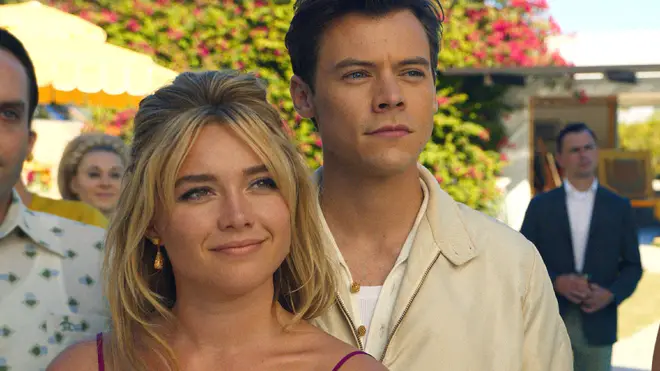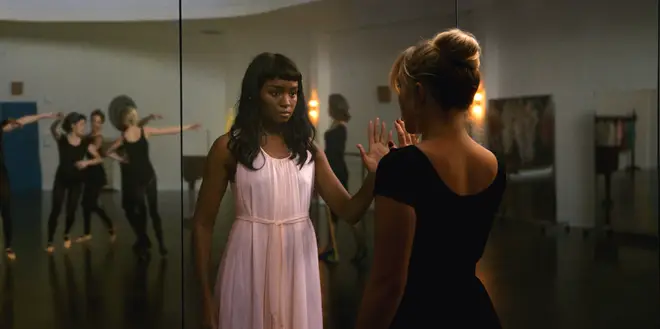On Air Now
Early Breakfast with Sam Pittis 4am - 6:30am
23 September 2022, 17:17 | Updated: 23 September 2022, 17:52

Watch the second trailer for Don't Worry Darling
From the composer behind How to Train Your Dragon comes a spine-chilling score to Olivia Wilde’s psychological thriller, starring Harry Styles and Florence Pugh.
Don’t Worry Darling, the latest project of actor and director Olivia Wilde, hit cinema screens on Friday 23 September with its star-studded cast featuring Wilde, Harry Styles, Florence Pugh, Chris Pine and Gemma Chan.
The soundtrack combines the jaunty upbeat sound of jazz and soul music by the likes of Dizzy Gillespie, Ray Charles and the Benny Goodman Trio, with a dystopian and unsettling original score by composer John Powell.
Powell is perhaps best known for his scores to the How to Train Your Dragon trilogy (2010-2019), the first of which earned him an Oscar nomination, as well as Chicken Run (2000) and the Happy Feet films (2006-2011), for which he was nominated for a Grammy Award.
The original score to Don’t Worry Darling sees John Powell reaching into a much darker mood to create a spooky dynamic that unsettles the seemingly idyllic life of Jack (Styles), Alice (Pugh), and their neighbours in Victory, USA.
If you haven’t already seen the film, beware of spoilers ahead…
Read more: The Rings of Power soundtrack – a mystical musical return to middle earth

Don’t Worry Darling is a psychological thriller, set in the experimental town of Victory. On the surface, it’s all idyllic, 1950s Americana, complete with hard-working husbands, obedient housewives, and happy families. At the helm of it all is the mysterious Frank, played by Chris Pine, who founded the ‘Victory Project’ where all the town’s men work.
But in a shock twist, we find out that all is not as it seems.

John Powell’s original score perfectly juxtaposes the upbeat records played by the characters themselves, and pays homage to some of cinema’s greatest soundtracks as well as pioneering composers of the 20th century.
The first hint in the soundtrack that something ominous is afoot, is Powell’s use of extremely low notes, some with frequencies near, or below the threshold of human hearing. Notes at this frequency cannot be heard, only felt – a technique previously used by Steven Price in the score to the 2013 sci-fi film Gravity.
Powell harks back to film score royalty, with a nod to one of cinema’s most infamous scoring moments. In Alfred Hitchcock’s 1960 horror, Psycho, Bernard Herrmann infamously wrote a piercing violin line for the shower scene, as the main character is stabbed to death.
In Don’t Worry Darling, as one character stands on the roof to her house, knife in hand, Powell’s score echoes Herrmann’s work with a sharp, stabbing motif.
Read more: The 50 best film scores of all time

Pianist performs terrifying version of 'Psycho' theme with knives
Much of Powell’s score is also reminiscent of the experimental electronic music that was emerging from studios across Europe in the mid to late-20th century, most prominently in England, France and Germany.
Through manipulations of recorded sound, Powell reverses, distorts, speeds up and slows down, chops, and changes his score in a manner that recalls the pioneering work of Karlheinz Stockhausen, Pierre Schaeffer and Eliane Radigue.
The haunting voices of a women’s choir accompany many of the tense moments in the film, with wordless phrases that progress into spine-chilling primal cries.
The thread that runs through the entire film, incorporated into the storyline and the soundtrack, is a simple motif hummed by Alice as she goes about her day-to-day life. As her flashbacks become more vivid and detailed, Alice remembers more of the song and where she knows it from, ultimately revealing the major plot twist at the end of the film.
The melody was written by Harry Styles, who apparently came up with it in 15 minutes after noodling on the piano. He later put words to the melody, and the result is a slightly eerie track titled ‘With You All the Time’, sung by the lead characters Alice and Jack.

How to Train your Dragon... on the ORGAN! | Anna Lapwood
In addition to Powell’s original score, the film also includes ‘diegetic’ music – music that is part of the film’s scene and is heard by the characters as well as the audience.
In Don’t Worry Darling, the playlist is curated by music editor Bill Bernstein and features upbeat jazz and soul tracks from the 1950s and 60s including: